Protesters Gathered Outside Food 4 Less to Oppose Closure in North Long Beach Food Desert
by Nick Eismann, Contributor | Published February 23, 2021 in Journalism
6 minute readOn Sunday, a handful of activists gathered in front of the Food 4 Less to protest its impending closure—which its parent company Kroger Co. says is largely due to a new local mandate requiring grocers meeting certain criteria to pay employees an extra $4 an hour in “hero pay.”
The protesters said the closing of this store, along with a Ralphs on North Los Coyotes Diagonal, will have an immediate impact on the 300 employees and their families who will lose income, putting them at risk of possible homelessness and raising the unemployment rate in Long Beach. It will also impact the surrounding communities who depend on these grocery stores to feed their families.
According to the U.S. Department of Agriculture, Long Beach already has several “food deserts”—neighborhoods where residents do not readily have access to nutritional and affordable food. With other areas in the city teetering on the edge of becoming food deserts, a grocery store closure could have dire consequences, especially in low-income communities where reliable transportation is less accessible. According to the Los Angeles County Department of Public Health, 36.9% of low-income families in Long Beach experience food insecurity and 16.2% experience very low food security.
Parts of North Long Beach, where the Food 4 Less is set to close, have already been designated food deserts. According to a 2019 study, residents there complained about development in the area which tends to bring more unhealthy food establishments. “At a neighborhood association meeting locals called for a new grocery store,” the study stated. “They said that they did not need any more fast-food restaurants.”
The Party for Socialism and Liberation (PSL) planned the Sunday protest, and in a statement said, “The closure of the Food 4 Less in North Long Beach is also an attack on the community as it is one of the few affordable grocery stores in an area increasingly stricken by food deserts.” Workers from the Food 4 Less did not participate in the rally.
The activists were later joined by protestors who had been demonstrating outside the Ralphs earlier in the day.
Kroger, which owns both stores, described them as “underperforming” and called the “hero pay” mandate “misguided.”
“The irreplaceable harm that will come to employees and local citizens as a direct result of the city of Long Beach’s attempt to pick winners and losers, is deeply unfortunate,” a Kroger spokesperson said. “We are truly saddened that our associates and customers will ultimately be the real victims of the city council’s actions.”
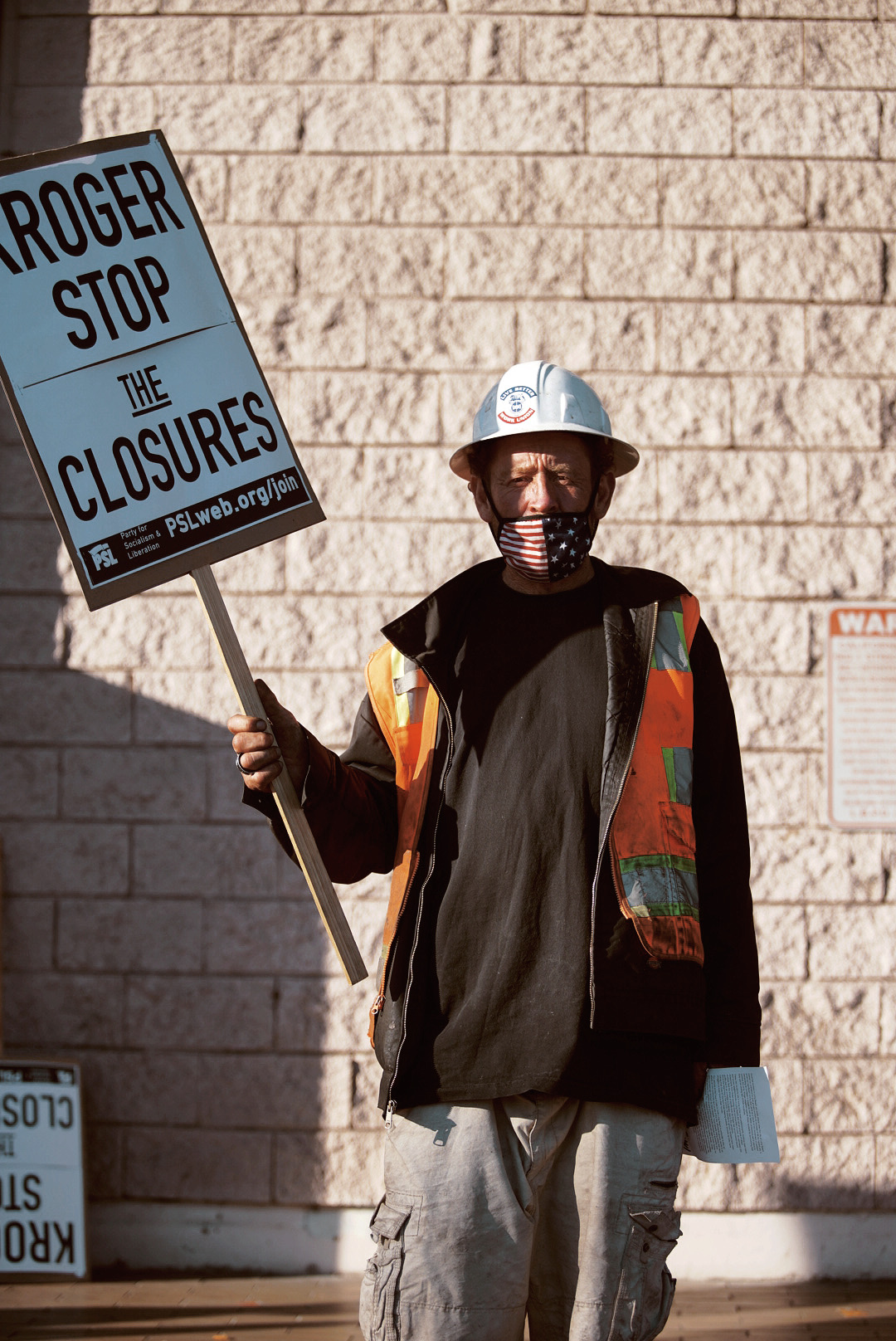
A protester demonstrated while wearing personal protective equipment on Sunday. Photo by Santiago Charboneau.
But protesters like Javier Guerrero, a member of the PSL, place more blame on Kroger than the ordinance.
“Malcolm X used to say ‘what’s so skillful about them is that they can make the criminal look like the victim and the victim look like the criminal.’ And that’s exactly what Kroger is trying to do,” Guerrero stated. “They’re trying to change the lines, make it seem like it is the store [owner that is the victim], that they have to pay.”
Tomisin Oluwole
Face the Music, 2022
Acrylic on canvas
24 x 36 inches
Click here to check out our interview with Tomisin Oluwole, a literary and visual artist based in Long Beach.

Instead of gunking up our site with ads, we use this space to display and promote the work of local artists.
The demonstrators expressed their anger towards Kroger’s hypocrisy as well.
“In the beginning of the pandemic, they wanted to call essential workers heroes,” Guerrero said. “We clapped for them and we thanked them for their service the same way we thank the military, yet they forced them to risk their lives to give to a company that [gave] them very little PPE at the beginning. And now that they have some benefits, some protection through hazard pay… [Kroger] doesn’t want to pay them, they just want to enrich themselves just like the other capitalists during the pandemic.”
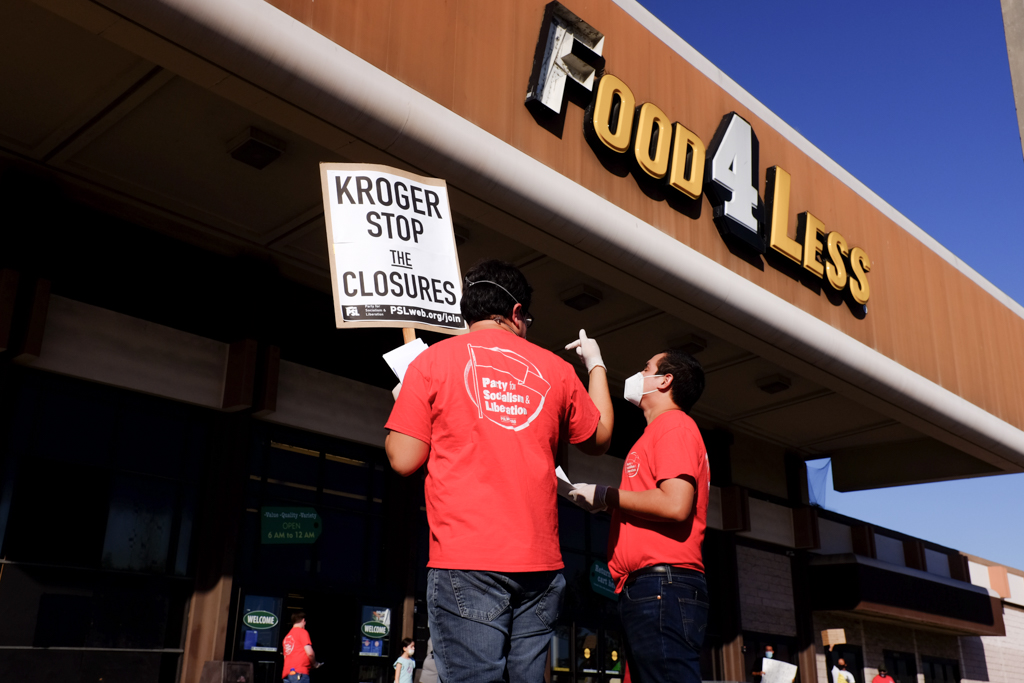
Protesters stand in the Food 4 Less parking lot, pamphlets in-hand to give out to shoppers. Photo by Nick Eismann.
According to a Brookings Institute report, Kroger ended its own established $2 per hour “hero pay” in mid-May, despite doubling its profits and spending nearly a billion dollars in 2020 to buy back its own stock shares. These stock buybacks helped Kroger re-invest in themselves, causing their stock to rise in value. The report stated that “despite pressure from unions, negative media attention, and even comments from President Joe Biden and Vice President Kamala Harris calling on CEOs to institute hazard pay, many large grocery and retail companies are choosing not to invest their pandemic profits back into workers.”
The United Food and Commercial Workers International (UFCW) union denounced the decision to close the Food 4 Less and Ralphs, saying that the move was an effort to dodge the new hazard pay law.
“Kroger closing these stores is truly outrageous conduct and a ruthless attempt to create a chilling effect that will discourage other cities from doing what is right and enacting hazard pay mandates,” UFCW President Marc Perrone said in a statement.
In a Feb. 1 tweet, Mayor Robert Garcia pushed back against the grocery store behemoth. “The Kroger corporation is closing two markets in Long Beach because our city is requiring temporary hero’s pay for grocery workers during this pandemic. Grocers are making record profits. We go to court this month and will defend the workers vigorously,” he wrote.
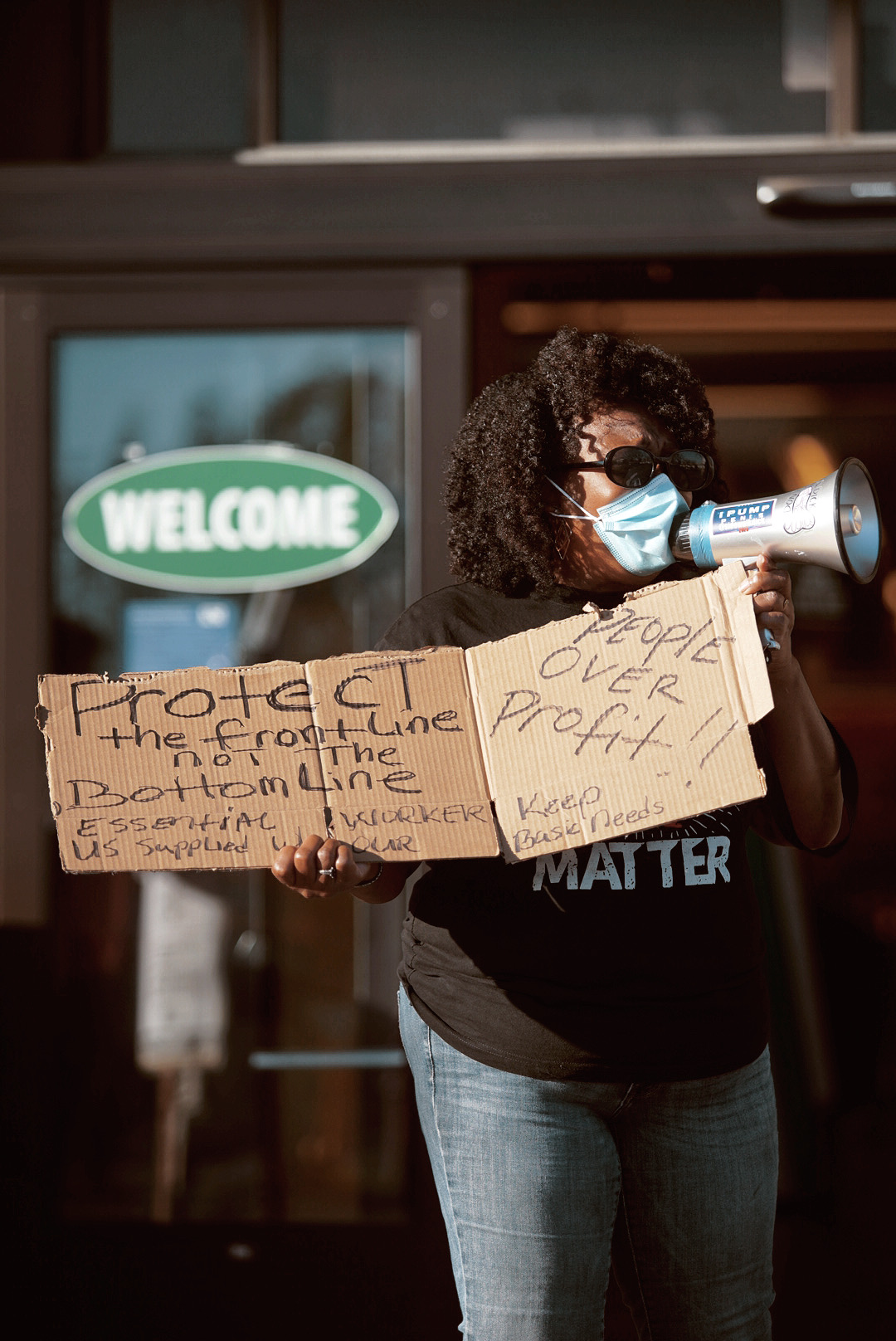
A protester spoke through a megaphone in front of the Food 4 Less during the demonstration. Photo by Santiago Charboneau.
The UFCW stated that many other local governments have acted to ensure that grocery workers receive compensation for the risk they have put themselves in during the pandemic. They found that over 75% of Americans support the pay increase, and local governments including Los Angeles County, Santa Monica, San Jose, San Mateo as well as many others are considering implementing hazard pay.
“If these stores close, 300 workers will be affected. That’s 300 families who will not be able to pay the rent, that’s 300 families who will not be able to pay for food. They call it food insecurity, but it is really hunger, they’re going to go hungry,” Guerrero said. “The community of North Long Beach won’t have access to good food for low prices… this is a food desert, people will have to pay higher prices for food.”
“But if the CEO of Kroger was to be replaced, or didn’t go to work one day,” he added, “no one will notice, the supply chain will continue. The workers will continue to work, people will continue to buy goods, because the bosses are not essential.”
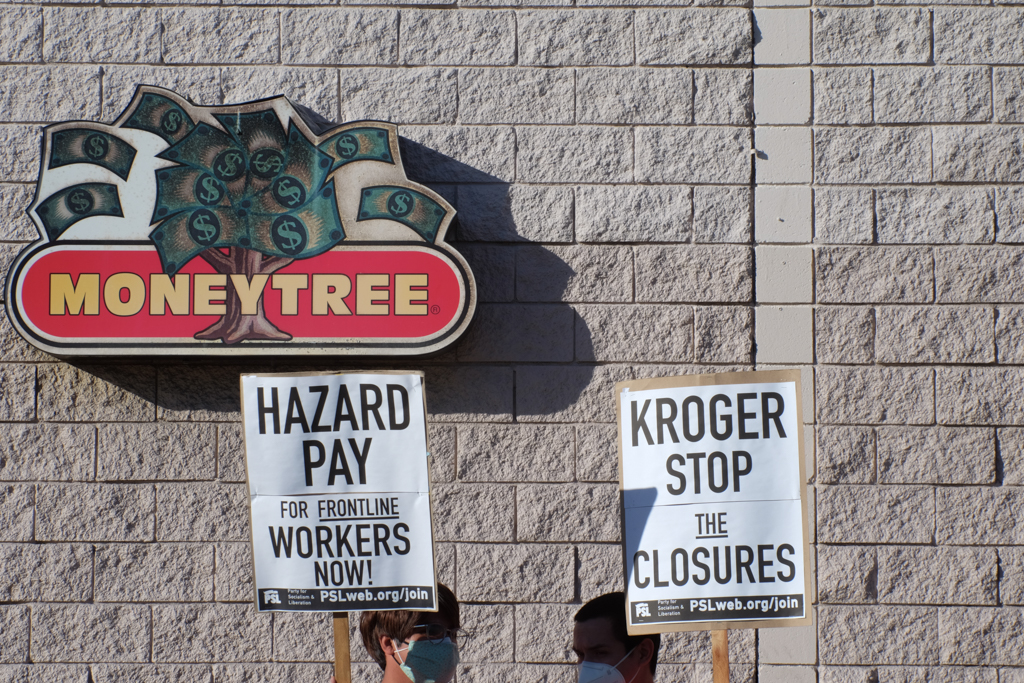
Protesters held up signs calling on Kroger to stop the closures of stores and give hazard pay to workers. Photo by Nick Eismann.
Help Us Create An Independent Media Platform for Long Beach
We believe that what we are trying to do here is not only unique, but constitutes a valuable community resource. We are dedicated to building a fiercely independent, not-for-profit, and non-hierarchical media organization that serves Long Beach. Our hope is that such a publication will increase civic participation, offer a platform to marginalized voices, provide in-depth coverage of our vibrant art scene, and expose injustices and corruption through impactful investigations. Mainly, we plan to continue to tell the truth, and have fun doing it. We know all this sounds ambitious, but we’re on our way there and making progress every day.
Here’s what we don’t believe in: our dominant local media being owned by one of the city’s wealthiest moguls or a far-flung hedge fund. We believe journalism must be skeptical and provide oversight. To do so, a publication should remain free from financial conflicts of interest. That means no sugar daddy or mama for us, but also no advertisements. We answer to no one except to our readers.
We call ourselves grassroots media not only because we are committed to producing work that is responsive to you, dear reader, but because in order for this project to continue we will also need your support. If you believe in our mission, please consider becoming a monthly donor—even a small amount helps!

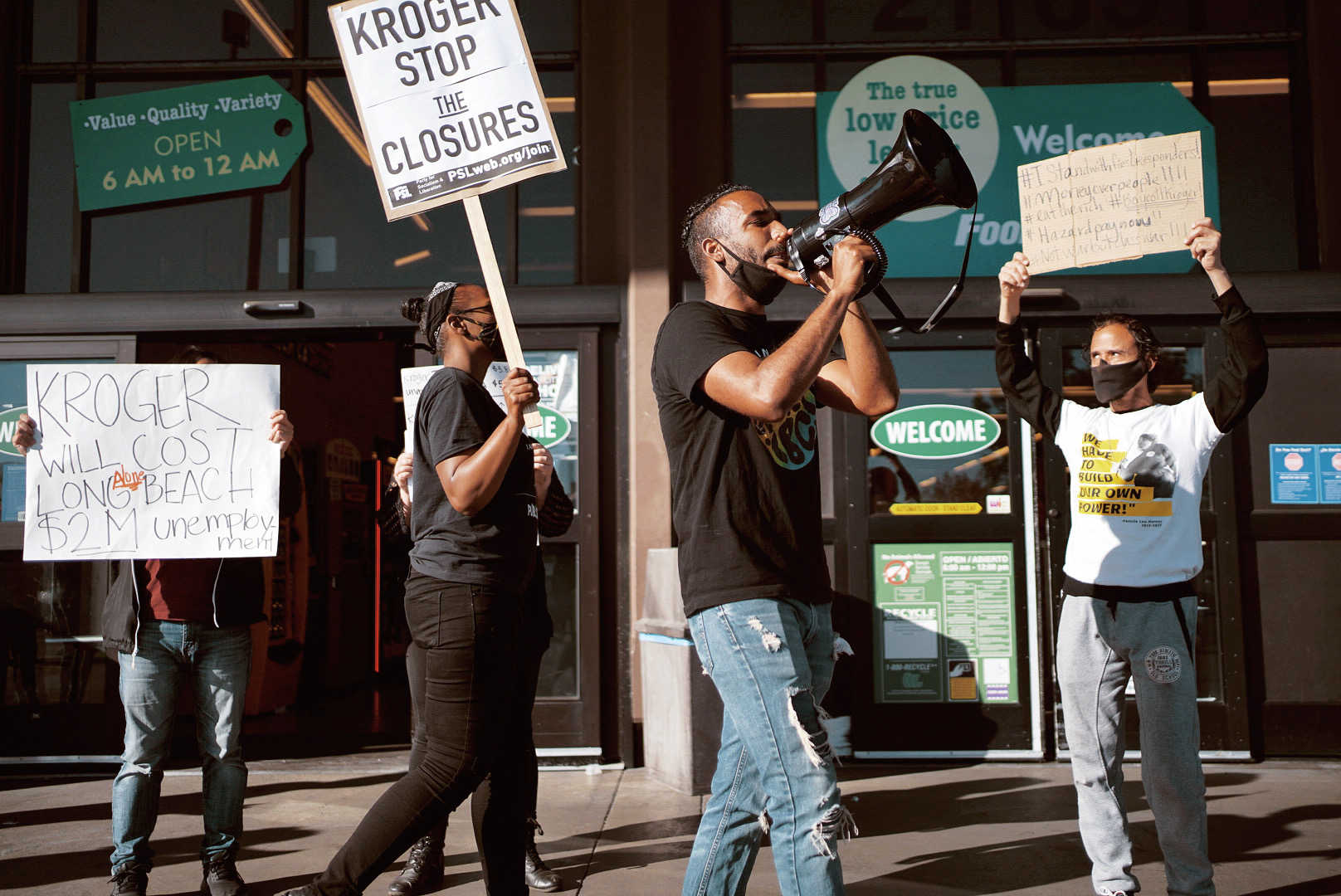
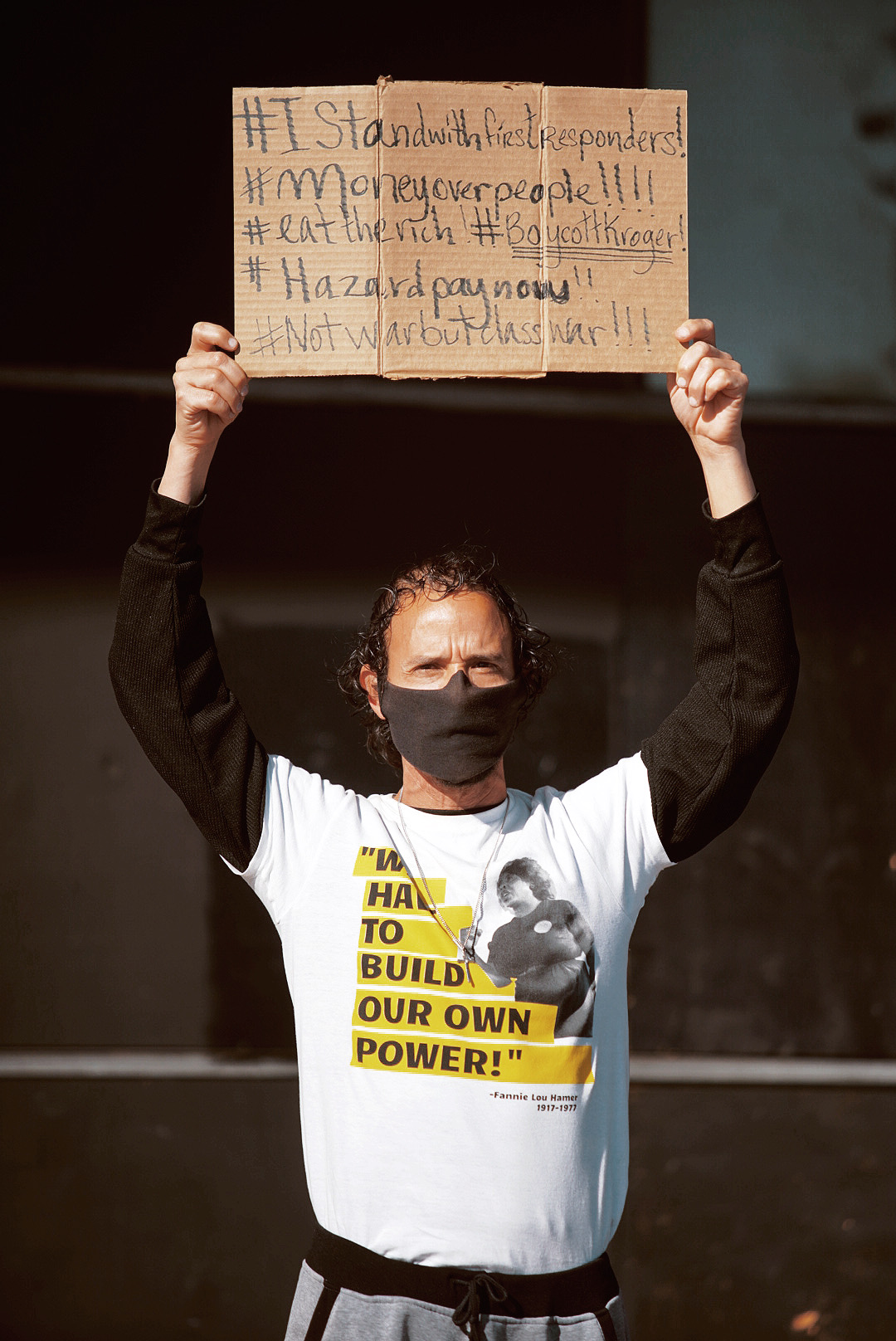
 nickeismann@gmail.com
nickeismann@gmail.com




